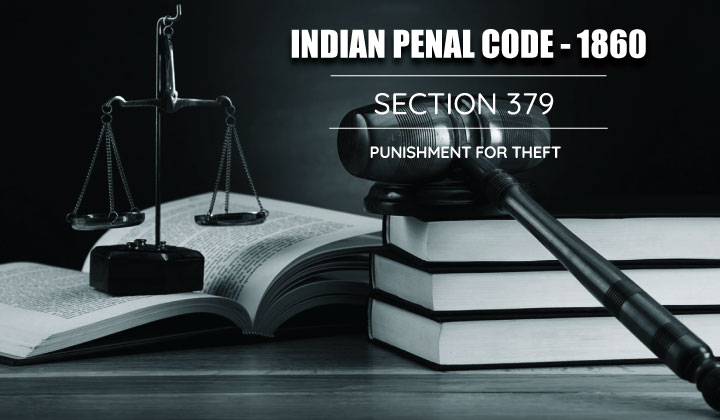Punishment for Theft - Section 379

According to section 378 of the Indian penal code, Whoever, intending to take dishonestly any movable property out of the possession of any person without that person's consent, moves that property to such taking is said to commit theft. Section 379: Anyone committing the act of theft shall be punished with imprisonment of either description for a term which may extend to three years, or with fine, or with both. Consult the best lawyer online Illustrations: If X commits any act of theft against Y then the victim Y can go to the police station and file a complaint against X and the charges will be counted under the offense section 378 and the punishment for this would lie in section 379. A cut down a tree on Z's ground with the intention of dishonestly taking the tree out of Z's possession without Z's consent here, A has severed the tree in order to such taking, he has committed theft. Here in this case Z can go to the police station and file a case against A claiming that A has committed theft, A will be punished under Section 379 for intentionally committing the crime. 379A. Snatching - Whoever, having an intention for committing theft, quickly or suddenly quickly or forcibly seizes or secures or takes away from any person or his physical possession of any moveable property, and attempts to escape with such property, is termed commit snatching. Whoever attempts to commit the act of snatching shall be punished with rigorous imprisonment for a term of at least five years extending up to ten years, and extending up to twenty-five thousand rupees. Whoever commits snatching shall be punished with rigorous imprisonment for a term which shall not be less than seven years but which may extend to ten years, and with fine which may extend to twenty-five thousand rupees. Anyone after committing or attempting to commit snatching, causes hurt or wrongful restraint of fear of hurt, to effect his escape the accused shall be punished with rigorous imprisonment for a term which may extend to three years, in addition to the punishment provided for the offense of snatching by the preceding sub-sections.
What offense is defined under IPC 379?
IPC 379 covers the offenses of Theft.
What is the punishment for IPC 379 Case?
The person committing theft IPC 379 is punishable with 3 years or fine or both.
Is IPC 379 a cognizable offense or a non-cognizable offense?
This is a cognizable offense.
An offense in which the police have the authority to arrest an accused without a warrant is termed under a Cognizable offense. The officer can also arrest an accused under the first schedule of any law, Section 154 of CrPC provides that under a Cognizable offense or case.
Some offense in which the police officer has no right or authority to arrest without a warrant falls under Non âcognizable offense. The examples of cognizable offenses: Kidnapping, Dowry Theft, Culpable Homicide, Waging War, Murder, Rape, Death, Unnatural Offences.
The non-cognizable offenses are minor assault or causing simple hurt
How to file/defend your case for IPC 379 offense?
The first and the foremost thing after a particular crime takes place is to go to the local police station either the victim or the relative, friends or family of the victim must file a case, then the next step is to hire a legal practitioner who has a grip on criminal law or have a long term experience on how to move forward with the case. Then with the help of proper evidence the case can be proved, even the bail can also be pleaded depending upon the type of cases, it is upon the discretion of the court whether to grant the bail or not.
A consumer can hire a lawyer through Lawtendo t as it provides the best of best lawyers, who can guide laymen to a successful way out, court procedures often seem very entangled but lawyers here will make the process seem very simple and easy much comfortable than rolling into court campuses in search of good and reputed lawyers, everything here is strategically planned and giving satisfactory service to the consumers is our main motive. Lawtendo is a law-tech company that has around 15000+ lawyers across India on our platform who can help you file/defend your case for IPC Section 325. Lawtendo aims to facilitate legal services/advice provided to the clients are cost-efficient and quality service. You can contact us at +91 967133666 or info@lawtendo.com.
Is IPC 379 a bailable or non-bailable offense?
This is a Non-Bailable offense.
In a bailable offense, the grant of bail is a matter of right. The right may be either given by a police officer who is in the custody of Accused or by the court holding discretion. The accused may be released on the execution of a âbail bondâ, with or without sureties.
Get in touch with the best lawyer online
In a non-bailable offense, there is no matter of right in the grant of bail but still, the accused can apply for bail with suitable causes it is upon the court to grant it or not.
In what court can IPC 379 be tried?
offenses under 379 are tried in the court of Any Magistrate.
| Offence | Punishment | Cognizance | Bail | Triable By |
|---|---|---|---|---|
| Punishment for theft | 3 Years or Fine or Both | Cognizable | Non-Bailable | Any Magistrate |
| Offence | Punishment for theft |
|---|---|
| Punishment | 3 Years or Fine or Both |
| Cognizance | Cognizable |
| Bail | Non-Bailable |
| Triable By | Any Magistrate |


